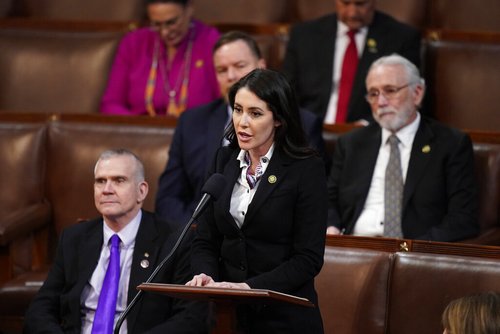Congresswoman Hageman: “Excited” to Get Started After “Arduous” Speaker’s Race
The newest member of Wyoming’s Congressional delegation was sworn in early Saturday morning
- Published In: Politics
- Last Updated: Jan 09, 2023

Lawmakers including Congresswoman Harriet Hageman (R-Wyo.) were sworn-in early Saturday morning, after an historic and drawn-out battle over House Speaker (AP Photo/Andrew Harnik)
By Jacob Gardenswartz
Special to the Wyoming Truth
WASHINGTON — At 1:39 a.m. on Saturday, Jan. 7, Congresswoman Harriet Hageman (R-Wyo.) and the other newly-elected members of Congress took the oath of office and were officially seated as members of the U.S. House of Representatives.
The members’ swearing-in — four days later than originally planned — came after an historic battle for House speaker, an election which required 15 votes and now stands as the longest speaker’s race since before the Civil War.

Rep. Kevin McCarthy (R-Calif.) ultimately emerged successful, though not without significant difficulty. Arguing the need for a more conservative leader, a coalition of 20 far-right lawmakers refused to back him for days, resulting in over a dozen failed votes for a post which hadn’t required more than one ballot in 100 years.
“My father always told me: It’s not how you start, it’s how you finish. And now we need to finish strong for the American people,” McCarthy said in remarks Saturday morning.
To garner the holdouts’ support, McCarthy made a number of key concessions, empowering his one-time detractors and greatly limiting his own ability to exert control over the chamber. The saga previews the challenges McCarthy is likely to face on more controversial matters moving forward, with intra-party disagreements far from resolved and the Republican majority premised on extremely thin margins.
Touting McCarthy’s concessions, Hageman “energized” by speaker process
Despite aligning herself with many of the McCarthy holdouts during her campaign, Hageman backed the Republican leader throughout the drawn-out speaker’s race, going so far as to release a statement of her support circulated by McCarthy’s allies ahead of the first vote.
Shortly after she was sworn-in, Hageman said she’s “honored” Wyoming voters trusted her to represent them, and promised to begin her work limiting the size and scope of the federal government.
“While the process may have seemed messy to those watching,” her statement read, “the debate and discussion was necessary to move the House of Representatives in a more conservative, open, and transparent direction so that it will function better for the American people.”
In subsequent comments posted on Twitter, Hageman acknowledged that voting for speaker was an “arduous process,” but argued the concessions won by conservatives will “lead to a more open and accountable Congress.”
Asked about her unique and historic welcome to D.C., a spokesman told the Wyoming Truth Hageman was “quite the opposite of exhausted,” arguing that “she was energized by the debate and discussions that took place.”
The House is set to reconvene at 5 p.m. on Monday, when lawmakers will vote on a package establishing the rules for this Congress and appointing members to committees.
McCarthy wins by limiting his own power
To win the support of his detractors, McCarthy made several key concessions that greatly limit his own ability to lead the chamber and empower the conservative minority who opposed him.
Chief among the demands of the McCarthy holdouts was lowering the threshold to bring a “motion to vacate the chair” to one vote, enabling any one lawmaker to force a vote of confidence in the House speaker. Such a vote was what helped oust former Speaker John Boehner (R-Ohio) in 2015.
Under the rules put forward by Speaker Nancy Pelosi (D-Calif.), a majority of one party in Congress was required to bring such a motion. McCarthy had initially proposed lowering that number to five members, but ultimately gave in to his opponents’ demands for a one-person threshold.
Celebrating the move, Rep. Matt Gaetz (R-Fla.) — one of McCarthy’s chief detractors — boasted Sunday on Fox News that “the construct of these rules concessions functionally turn the speakership into a ceremonial position.”

As a part of his compromise, McCarthy also agreed to allow his detractors to appoint one-third of the members on the Rules Committee, in effect enabling them to control which pieces of legislation make it to the floor. Such a post also allows the far-right lawmakers to insert so-called “poison pill” amendments into bills they dislike, stymying their chances of passage.
McCarthy also promised to bring certain pieces of legislation forward for an up-or-down vote, including a constitutional amendment requiring the federal government not to spend more than its income from taxes in a given year and a bill vastly tightening border security.
Still, by giving into the demands of the GOP holdouts, McCarthy may have angered some of the moderates in his conference. Already, Rep. Tony Gonzales (R-Texas) has said he would oppose the rules package as it stands, with others voicing similar concerns.
Speaker saga foretells more difficulties to come
The prolonged battle over House speaker resulted in some of the most chaotic scenes in the Congress in recent memory. Lawmakers involved in negotiations were pictured shouting at each other, with one physical altercation breaking out: Rep. Mike Rogers (R-Ala.) lunged at Gaetz, and had to be restrained by Rep. Richard Hudson (R-N.C.).
In reality, though, the vote for speaker was among the easier tasks facing McCarthy. Now comes the harder part: leading a functioning GOP majority with just a four-vote margin.
Already, there’s trouble on the horizon. Beyond Republicans’ policy priorities, lawmakers must also pass a dozen spending bills to fund the government and vote to raise the borrowing limit enabling the U.S. Treasury Department to finance the federal debt. Without an agreement on spending bills, the government will shut down. Without raising the debt ceiling, the U.S. would default on its debt, something which has never happened before and would likely cripple the global economy.
McCarthy’s holdouts won an agreement to allow for unlimited amendments on spending bills, which could bring about chaos as the funding deadline grows closer. They also extracted a promise that any deal to raise the debt ceiling would be accompanied by significant spending cuts, a measure President Joe Biden would surely veto.
Through it all, McCarthy has publicly postured optimism. “This is the great part,” he told reporters Friday shortly before he was elected speaker. “Because it took this long, now we learned how to govern.”













